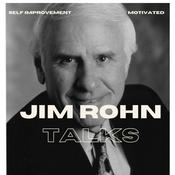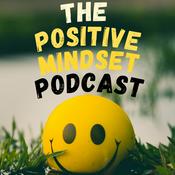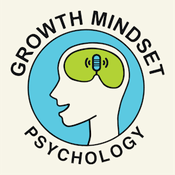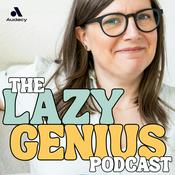276 episodes
- Want to learn how to stop comparing yourself to others? Jealousy is often seen as negative, but you can learn to deal with jealousy through curiosity and values work.
Learn the skills to Regulate your Emotions, join the membership: https://courses.therapyinanutshell.com/membership
Jealousy and envy are emotions we all feel, especially when we get stuck in comparison—seeing someone confident or attractive and instantly wondering what’s wrong with us. But jealousy isn’t a flaw; it’s a messenger. In this Therapy in a Nutshell episode, Emma McAdam breaks down how to stop comparing yourself to others so you can actually understand what your jealousy is trying to tell you.
Looking for affordable online counseling? My sponsor, BetterHelp, connects you to a licensed professional from the comfort of your own home. Try it now for 10% off your first month: https://betterhelp.com/therapyinanutshell
Learn more in one of my in-depth mental health courses: https://courses.therapyinanutshell.com
Support my mission on Patreon: https://www.patreon.com/therapyinanutshell
Sign up for my newsletter: https://www.therapyinanutshell.com
Check out my favorite self-help books: https://kit.co/TherapyinaNutshell/best-self-help-books
Therapy in a Nutshell and the information provided by Emma McAdam are solely intended for informational and entertainment purposes and are not a substitute for advice, diagnosis, or treatment regarding medical or mental health conditions. Although Emma McAdam is a licensed marriage and family therapist, the views expressed on this site or any related content should not be taken for medical or psychiatric advice. Always consult your physician before making any decisions related to your physical or mental health. In therapy I use a combination of Acceptance and Commitment Therapy, Systems Theory, positive psychology, and a bio-psycho-social approach to treating mental illness and other challenges we all face in life. The ideas from my videos are frequently adapted from multiple sources. Many of them come from Acceptance and Commitment Therapy, especially the work of Steven Hayes, Jason Luoma, and Russ Harris. The sections on stress and the mind-body connection derive from the work of Stephen Porges (the Polyvagal theory), Peter Levine (Somatic Experiencing) Francine Shapiro (EMDR), and Bessel Van Der Kolk. I also rely heavily on the work of the Arbinger Institute for my overall understanding of our ability to choose our life's direction.
And deeper than all of that, the Gospel of Jesus Christ orients my personal worldview and sense of security, peace, hope, and love https://www.churchofjesuschrist.org/comeuntochrist/believe
If you are in crisis, please contact the National Suicide Prevention Hotline at https://suicidepreventionlifeline.org or 1-800-273-TALK (8255) or your local emergency services.
Copyright Therapy in a Nutshell, LLC - If you have ADHD and your emotions feel overwhelming, fast, or hard to control—you’re not broken, lazy, or “too sensitive.” In this episode of Therapy in a Nutshell, I explain the brain science behind ADHD and emotional dysregulation—including delayed prefrontal cortex development, dopamine and norepinephrine differences, rejection sensitive dysphoria (RSD), and why emotions can hit before your “brakes” have time to turn on.
Up to 70% of people with ADHD struggle with emotional regulation, and there are real neurological reasons why. I’ll break down: Why ADHD emotions feel so intense and reactive How executive dysfunction affects impulse control, frustration tolerance, and emotional recovery What rejection sensitive dysphoria (RSD) is and why criticism can feel physically painful Biological triggers that worsen emotional dysregulation (sleep, hunger, sensory overload) ADHD emotional “superpowers” that often get overlooked
Looking for affordable online counseling? My sponsor, BetterHelp, connects you to a licensed professional from the comfort of your own home. Try it now for 10% off your first month: https://betterhelp.com/therapyinanutshell
Learn more in one of my in-depth mental health courses: https://courses.therapyinanutshell.com
Support my mission on Patreon: https://www.patreon.com/therapyinanutshell
Sign up for my newsletter: https://www.therapyinanutshell.com
Check out my favorite self-help books: https://kit.co/TherapyinaNutshell/best-self-help-books
Therapy in a Nutshell and the information provided by Emma McAdam are solely intended for informational and entertainment purposes and are not a substitute for advice, diagnosis, or treatment regarding medical or mental health conditions. Although Emma McAdam is a licensed marriage and family therapist, the views expressed on this site or any related content should not be taken for medical or psychiatric advice. Always consult your physician before making any decisions related to your physical or mental health. In therapy I use a combination of Acceptance and Commitment Therapy, Systems Theory, positive psychology, and a bio-psycho-social approach to treating mental illness and other challenges we all face in life. The ideas from my videos are frequently adapted from multiple sources. Many of them come from Acceptance and Commitment Therapy, especially the work of Steven Hayes, Jason Luoma, and Russ Harris. The sections on stress and the mind-body connection derive from the work of Stephen Porges (the Polyvagal theory), Peter Levine (Somatic Experiencing) Francine Shapiro (EMDR), and Bessel Van Der Kolk. I also rely heavily on the work of the Arbinger Institute for my overall understanding of our ability to choose our life's direction.
And deeper than all of that, the Gospel of Jesus Christ orients my personal worldview and sense of security, peace, hope, and love https://www.churchofjesuschrist.org/comeuntochrist/believe
If you are in crisis, please contact the National Suicide Prevention Hotline at https://suicidepreventionlifeline.org or 1-800-273-TALK (8255) or your local emergency services.
Copyright Therapy in a Nutshell, LLC - High Functioning Depression looks like coping with depression by keeping busy and distracting yourself with overwork. Learn 5 ways to overcome depression in this interview w/ Dr. Judith Joseph
Learn the skills to regulate your Emotions, join the membership: https://courses.therapyinanutshell.com/membership
Learn more about Dr. Judith's work and book: https://drjudithjoseph.com/ https://highfunctioningbook.com/
In this conversation, Dr. Judith Joseph discusses high functioning depression, a condition where individuals appear to be functioning well on the outside while struggling internally. She emphasizes the importance of recognizing and addressing this hidden depression proactively rather than waiting for a crisis. Dr. Joseph introduces her framework of the Five V's—Validation, Venting, Values, Vitals, and Vision—as a way to help individuals reclaim their joy and improve their mental health. The discussion also touches on the significance of understanding personal happiness and making small, actionable changes to enhance well-being.
Looking for affordable online counseling? My sponsor, BetterHelp, connects you to a licensed professional from the comfort of your own home. Try it now for 10% off your first month: https://betterhelp.com/therapyinanutshell
Learn more in one of my in-depth mental health courses: https://courses.therapyinanutshell.com
Support my mission on Patreon: https://www.patreon.com/therapyinanutshell
Sign up for my newsletter: https://www.therapyinanutshell.com
Check out my favorite self-help books: https://kit.co/TherapyinaNutshell/best-self-help-books
Therapy in a Nutshell and the information provided by Emma McAdam are solely intended for informational and entertainment purposes and are not a substitute for advice, diagnosis, or treatment regarding medical or mental health conditions. Although Emma McAdam is a licensed marriage and family therapist, the views expressed on this site or any related content should not be taken for medical or psychiatric advice. Always consult your physician before making any decisions related to your physical or mental health. In therapy I use a combination of Acceptance and Commitment Therapy, Systems Theory, positive psychology, and a bio-psycho-social approach to treating mental illness and other challenges we all face in life. The ideas from my videos are frequently adapted from multiple sources. Many of them come from Acceptance and Commitment Therapy, especially the work of Steven Hayes, Jason Luoma, and Russ Harris. The sections on stress and the mind-body connection derive from the work of Stephen Porges (the Polyvagal theory), Peter Levine (Somatic Experiencing) Francine Shapiro (EMDR), and Bessel Van Der Kolk. I also rely heavily on the work of the Arbinger Institute for my overall understanding of our ability to choose our life's direction.
And deeper than all of that, the Gospel of Jesus Christ orients my personal worldview and sense of security, peace, hope, and love https://www.churchofjesuschrist.org/comeuntochrist/believe
If you are in crisis, please contact the National Suicide Prevention Hotline at https://suicidepreventionlifeline.org or 1-800-273-TALK (8255) or your local emergency services.
Copyright Therapy in a Nutshell, LLC - New research shows people with anxiety have lower choline in the brain. What choline does and is choline a good supplement for anxiety
Learn the skills to Regulate your Emotions, join the membership: https://courses.therapyinanutshell.com/membership
Break the Anxiety Cycle in 30 days: https://courses.therapyinanutshell.com/anxietyskills
New neuroscience research suggests that people with anxiety disorders have lower levels of choline in the brain compared to those without anxiety. In this video I explain what choline is, how it supports acetylcholine and the nervous system, and what this study does—and does not—mean for anxiety.
You’ll learn: What choline does in the brain, how acetylcholine supports calm and regulation, whether low choline causes anxiety (or not), what the research actually says about supplementation, and practical, grounded ways to support your mental health ecosystem.
Looking for affordable online counseling? My sponsor, BetterHelp, connects you to a licensed professional from the comfort of your own home. Try it now for 10% off your first month: https://betterhelp.com/therapyinanutshell
Learn more in one of my in-depth mental health courses: https://courses.therapyinanutshell.com
Support my mission on Patreon: https://www.patreon.com/therapyinanutshell
Sign up for my newsletter: https://www.therapyinanutshell.com
Check out my favorite self-help books: https://kit.co/TherapyinaNutshell/best-self-help-books
Therapy in a Nutshell and the information provided by Emma McAdam are solely intended for informational and entertainment purposes and are not a substitute for advice, diagnosis, or treatment regarding medical or mental health conditions. Although Emma McAdam is a licensed marriage and family therapist, the views expressed on this site or any related content should not be taken for medical or psychiatric advice. Always consult your physician before making any decisions related to your physical or mental health. In therapy I use a combination of Acceptance and Commitment Therapy, Systems Theory, positive psychology, and a bio-psycho-social approach to treating mental illness and other challenges we all face in life. The ideas from my videos are frequently adapted from multiple sources. Many of them come from Acceptance and Commitment Therapy, especially the work of Steven Hayes, Jason Luoma, and Russ Harris. The sections on stress and the mind-body connection derive from the work of Stephen Porges (the Polyvagal theory), Peter Levine (Somatic Experiencing) Francine Shapiro (EMDR), and Bessel Van Der Kolk. I also rely heavily on the work of the Arbinger Institute for my overall understanding of our ability to choose our life's direction.
And deeper than all of that, the Gospel of Jesus Christ orients my personal worldview and sense of security, peace, hope, and love https://www.churchofjesuschrist.org/comeuntochrist/believe
If you are in crisis, please contact the National Suicide Prevention Hotline at https://suicidepreventionlifeline.org or 1-800-273-TALK (8255) or your local emergency services.
Copyright Therapy in a Nutshell, LLC - Making amends, making repairs is even more powerful than self forgiveness or self-compassion. When you learn to fix the harms you've caused you can truly find emotional freedom.
Learn the skills to Regulate your Emotions, join the membership: https://courses.therapyinanutshell.com/membership
Where to find Dr. Sarah Michaud https://www.youtube.com/@leavingcrazytown https://drsarahmichaud.com/
Ted Talk: Our story of rape and reconciliation - Thordis Elva and Tom Stranger https://www.youtube.com/watch?v=gyPoqFcvt9w
In this conversation, Dr. Sarah Michaud and I explore the profound themes of self-compassion, forgiveness, and the importance of making amends. We discuss how guilt and shame can manifest in our lives and the courage required to face our mistakes.
Looking for affordable online counseling? My sponsor, BetterHelp, connects you to a licensed professional from the comfort of your own home. Try it now for 10% off your first month: https://betterhelp.com/therapyinanutshell
Learn more in one of my in-depth mental health courses: https://courses.therapyinanutshell.com
Support my mission on Patreon: https://www.patreon.com/therapyinanutshell
Sign up for my newsletter: https://www.therapyinanutshell.com
Check out my favorite self-help books: https://kit.co/TherapyinaNutshell/best-self-help-books
Therapy in a Nutshell and the information provided by Emma McAdam are solely intended for informational and entertainment purposes and are not a substitute for advice, diagnosis, or treatment regarding medical or mental health conditions. Although Emma McAdam is a licensed marriage and family therapist, the views expressed on this site or any related content should not be taken for medical or psychiatric advice. Always consult your physician before making any decisions related to your physical or mental health. In therapy I use a combination of Acceptance and Commitment Therapy, Systems Theory, positive psychology, and a bio-psycho-social approach to treating mental illness and other challenges we all face in life. The ideas from my videos are frequently adapted from multiple sources. Many of them come from Acceptance and Commitment Therapy, especially the work of Steven Hayes, Jason Luoma, and Russ Harris. The sections on stress and the mind-body connection derive from the work of Stephen Porges (the Polyvagal theory), Peter Levine (Somatic Experiencing) Francine Shapiro (EMDR), and Bessel Van Der Kolk. I also rely heavily on the work of the Arbinger Institute for my overall understanding of our ability to choose our life's direction.
And deeper than all of that, the Gospel of Jesus Christ orients my personal worldview and sense of security, peace, hope, and love https://www.churchofjesuschrist.org/comeuntochrist/believe
If you are in crisis, please contact the National Suicide Prevention Hotline at https://suicidepreventionlifeline.org or 1-800-273-TALK (8255) or your local emergency services.
Copyright Therapy in a Nutshell, LLC
More Education podcasts
Trending Education podcasts
About Therapy in a Nutshell
I’m Emma McAdam, a Licensed Marriage and Family Therapist and my mission is to make mental health resources more easy to access. I take therapy skills and psychological research and condense them down into bite-sized nuggets of help.I’m here to spread the message that while mental illness is real, it’s common, it’s debilitating, it’s also treatable. There are dozens of research-backed approaches to treating depression, anxiety, and other mental illness. Change, growth, and healing are possible. Please keep courage! Try one little thing every day to improve your life and health and things can get so much better! Therapy in a Nutshell, and the information provided by Emma McAdam, is solely intended for informational and entertainment purposes and is not a substitute for advice, diagnosis, or treatment regarding medical or mental health conditions. Although Emma McAdam is a licensed marriage and family therapist, the views expressed on this site or any related content should not be taken for medical or psychiatric advice. Always consult your physician before making any decisions related to your physical or mental health.Therapy in a Nutshell and it’s logo are Registered Trademarks of Therapy in a Nutshell, LLC
Podcast websiteListen to Therapy in a Nutshell, Aware and Aggravated and many other podcasts from around the world with the radio.net app
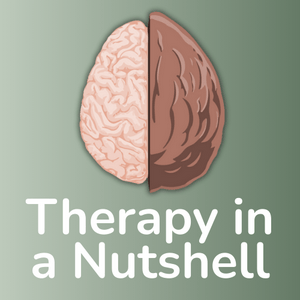
Get the free radio.net app
- Stations and podcasts to bookmark
- Stream via Wi-Fi or Bluetooth
- Supports Carplay & Android Auto
- Many other app features
Get the free radio.net app
- Stations and podcasts to bookmark
- Stream via Wi-Fi or Bluetooth
- Supports Carplay & Android Auto
- Many other app features


Therapy in a Nutshell
Scan code,
download the app,
start listening.
download the app,
start listening.


